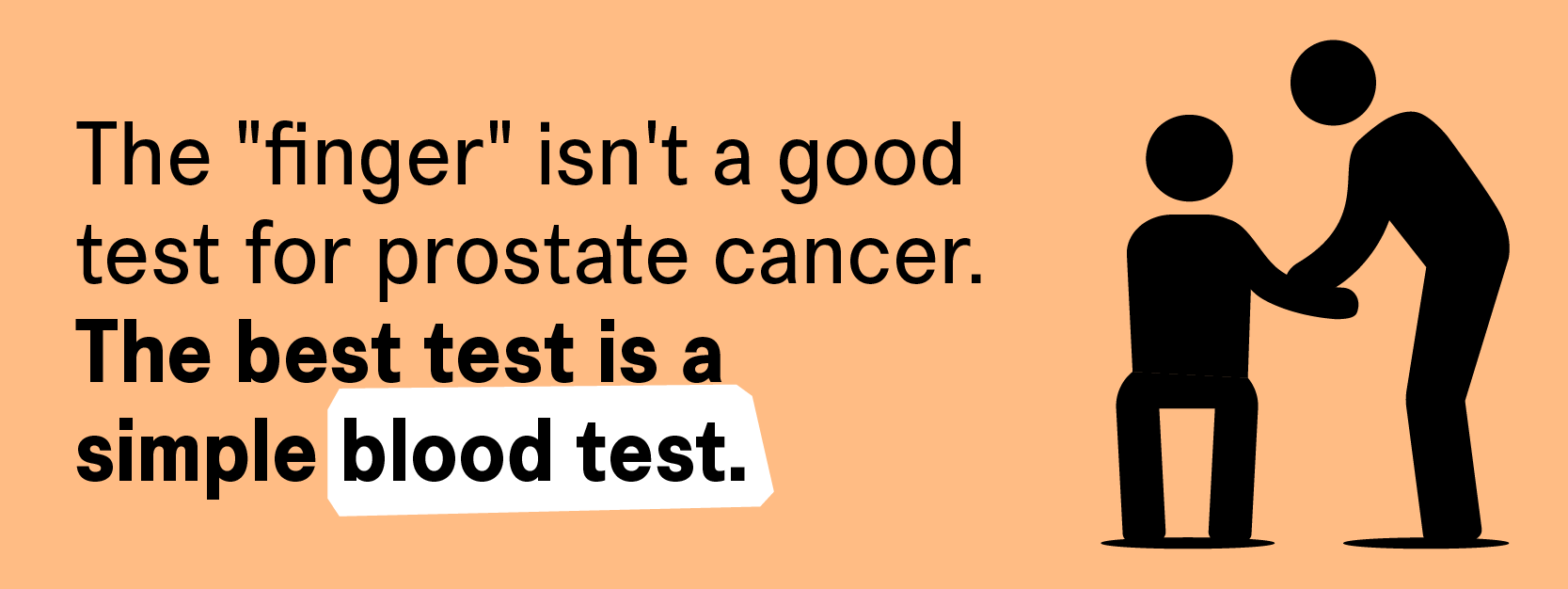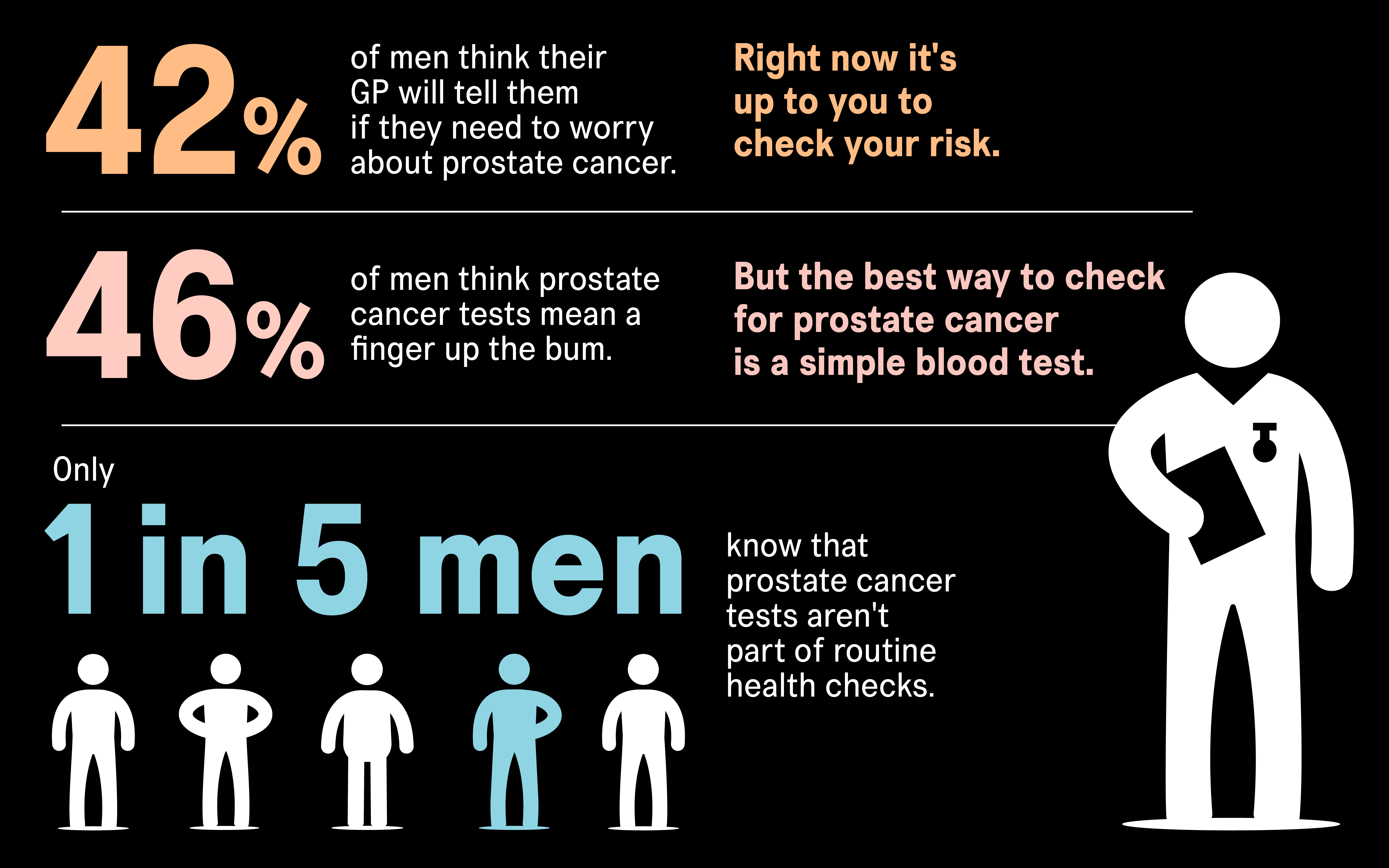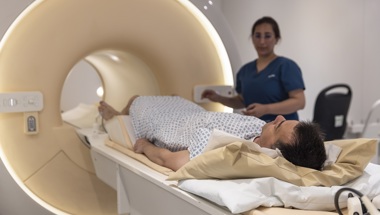Campaigns
04 Jun 2024You don’t need a ‘finger up the bum’ to diagnose prostate cancer - but around half of men think you do!
A ‘finger up the bum’ is not a useful test for prostate cancer, yet around half of men who haven’t checked their risk of the disease still think they’d need a rectal exam to get tested.

With Men’s Health Week and Father’s Day around the corner, we’re launching a major campaign to save men's lives by telling our dads, brothers, sons, and mates that it’s about time they checked their risk of getting prostate cancer.
Crucially, that means busting any myths and misconceptions stopping men from checking their risk and getting a life-changing earlier diagnosis.
That’s why we commissioned a survey asking men about the biggest barriers preventing them from finding out their prostate cancer risk.
Around a thousand men in the UK aged 50-70 took part, all of whom were at high risk of prostate cancer but hadn’t yet checked their risk.
The standout result was that 46% thought that they’d need to have a rectal exam to get tested for prostate cancer – and this was one of the biggest factors putting them off doing anything about their risk.
However, the best test for prostate cancer is a simple blood test you can get free from your GP. You don’t need a finger up the bum to test for prostate cancer.

Why is a rectal exam for prostate cancer no longer recommended?
The move away from a rectal exam is backed up by research published by our Clinical Advisory Group, which is made up of GPs, surgeons, doctors, radiographers and nurses specialising in prostate cancer.
Writing in the British Journal of General Practice – read by thousands of clinicians and researchers every month – they announced that the rectal exam is no longer a useful screening test for prostate cancer, as it doesn’t improve a doctor’s ability to diagnose the disease.
Instead, thanks to huge recent improvements in testing, the way doctors diagnose a man with prostate cancer is now safer and more accurate than ever.
Alongside the PSA blood test, the introduction of routine MRI scans for men with raised PSA results means that doctors are now able to give a much more precise diagnosis, which means that each man can get the safest and most appropriate treatment for his cancer, without a ‘finger up the bum’.

Will men be offered a PSA blood test?
Another major barrier the survey revealed was that 42% of men who haven’t yet checked their risk think it's up to their GP to tell them if they need to worry about prostate cancer.
What’s more, only 1 in 5 of the men knew that prostate cancer tests aren’t part of routine health checks.
At the moment, there’s no routine screening programme like there is for other cancers. GPs don’t contact men who have a higher risk of getting prostate cancer to tell them about getting tested.
But the good news is that you can quickly and simply find out your risk and what you can do about it using our online risk checker. More than 2.5 million men have already checked theirs, and you can do it in 30 seconds right now.
If you’re over 50, a Black man over 45, or you’ve got a family history of prostate cancer, you’re at higher risk of getting the disease, so you should think about getting a simple PSA blood test, which is available for free from your GP.

Does prostate cancer have symptoms?
The tricky thing about diagnosing prostate cancer is it often has no symptoms – and changes in how you pee are common, experienced by half the men in our research.
Yet 7 in 10 of the men said they’d wait until symptoms of any illness got really bad before visiting their GP.
The earlier you find prostate cancer, the easier it is to treat. So, whether you have any symptoms or not, find out your risk using our online risk checker, and if you are at higher risk think about getting a simple PSA blood test.
Prostate cancer may be the most common cancer in men, but it’s also the most survivable if you find it earlier.
Sophie Smith, Senior Specialist Nurse at Prostate Cancer UK, said: “If you’re thinking about getting a prostate cancer test, one of the first things that comes to mind is probably a doctor putting their finger up your bum. We hear it everywhere, from TV shows to jokes with mates, and it’s preventing too many men from getting checked for the disease that affects 1 in 8 of them.
“We’re finally putting an end to the misconception that getting tested for prostate cancer means you need to have a rectal exam – because, in fact, the best first test for the disease is a simple blood test that you can get for free from your GP.
“Thanks to recent advances like MRI scans being introduced and more effective therapies becoming available, the way we diagnose and treat prostate cancer is now more accurate, effective, and safe than it has ever been. You can find out more about this on our website, or chat to one of our Specialist Nurses, like me.”
Long-standing myths and misconceptions about prostate cancer testing mean too many lives are being cut short
The earlier prostate cancer is diagnosed, the easier it is to treat
Laura Kerby, Chief Executive of Prostate Cancer UK, said: “Prostate cancer is the most common cancer in men, but many don't realise that they’re at risk of getting the disease. This, combined with long-standing myths and misconceptions about prostate cancer testing, means that too many lives are being cut short.
“The good news is that the earlier you find prostate cancer, the easier it is to treat – and an earlier diagnosis could save your life. That means more summers setting off with your family on holiday, more dad-dancing at your daughter’s wedding, and more nail-biting seasons watching your team inch up the league table. So, the best time to do something about prostate cancer is right now.
“With Father’s Day around the corner, let’s tell our dads, sons, brothers, and mates that it’s about time they found out their risk of getting prostate cancer, which anyone can do easily using our online 30-second risk checker.
“If you’re over 50, Black, or you have a family history of the disease, I urge you to check your risk – whether you have symptoms or not.”





